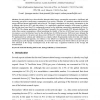Free Online Productivity Tools
i2Speak
i2Symbol
i2OCR
iTex2Img
iWeb2Print
iWeb2Shot
i2Type
iPdf2Split
iPdf2Merge
i2Bopomofo
i2Arabic
i2Style
i2Image
i2PDF
iLatex2Rtf
Sci2ools
105
click to vote
COMCOM
2010
2010
A BitTorrent proxy for Green Internet file sharing: Design and experimental evaluation
Recent studies have shown that the Internet-related energy consumption represents a significant, and increasing, part of the overall energy consumption of our society. Therefore, it is extremely important to look for energy-efficient Internet applications and protocols. The largest contribution to this energy consumption is due to Internet edge devices (PCs and data centers). As a particularly significant example, in this paper we address the fact that users leave their PCs continuously powered on for satisfying connectivity requirements of Peer-toPeer (P2P) file sharing applications, like BitTorrent (currently the most popular P2P Internet platform). To reduce these energy consumptions, without penalizing the Quality of Service of BitTorrent users, in this paper
COMCOM 2010 | Energy Consumptions | Internet-related Energy Consumption | Overall Energy Consumption |
| Added | 09 Dec 2010 |
| Updated | 09 Dec 2010 |
| Type | Journal |
| Year | 2010 |
| Where | COMCOM |
| Authors | Giuseppe Anastasi, Ilaria Giannetti, Andrea Passarella |
Comments (0)

